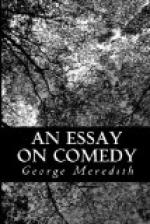The Misanthrope was yet more frigidly received. Moliere thought it dead. ‘I cannot improve on it, and assuredly never shall,’ he said. It is one of the French titles to honour that this quintessential comedy of the opposition of Alceste and Celimene was ultimately understood and applauded. In all countries the middle class presents the public which, fighting the world, and with a good footing in the fight, knows the world best. It may be the most selfish, but that is a question leading us into sophistries. Cultivated men and women, who do not skim the cream of life, and are attached to the duties, yet escape the harsher blows, make acute and balanced observers. Moliere is their poet.
Of this class in England, a large body, neither Puritan nor Bacchanalian, have a sentimental objection to face the study of the actual world. They take up disdain of it, when its truths appear humiliating: when the facts are not immediately forced on them, they take up the pride of incredulity. They live in a hazy atmosphere that they suppose an ideal one. Humorous writing they will endure, perhaps approve, if it mingles with pathos to shake and elevate the feelings. They approve of Satire, because, like the beak of the vulture, it smells of carrion, which they are not. But of Comedy they have a shivering dread, for Comedy enfolds them with the wretched host of the world, huddles them with us all in an ignoble assimilation, and cannot be used by any exalted variety as a scourge and a broom. Nay, to be an exalted variety is to come under the calm curious eye of the Comic spirit, and be probed for what you are. Men are seen among them, and very many cultivated women. You may distinguish them by a favourite phrase: ‘Surely we are not so bad!’ and the remark: ‘If that is human nature, save us from it!’ as if it could be done: but in the peculiar Paradise of the wilful people who will not see, the exclamation assumes the saving grace.
Yet should you ask them whether they dislike sound sense, they vow they do not. And question cultivated women whether it pleases them to be shown moving on an intellectual level with men, they will answer that it does; numbers of them claim the situation. Now, Comedy is the fountain of sound sense; not the less perfectly sound on account of the sparkle: and Comedy lifts women to a station offering them free play for their wit, as they usually show it, when they have it, on the side of sound sense. The higher the Comedy, the more prominent the part they enjoy in it. Dorine in the Tartuffe is common-sense incarnate, though palpably a waiting-maid. Celimene is undisputed mistress of the same attribute in the Misanthrope; wiser as a woman than Alceste as man. In Congreve’s Way of the World, Millamant overshadows Mirabel, the sprightliest male figure of English comedy.




